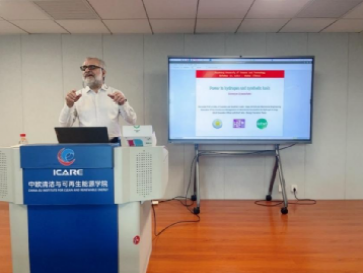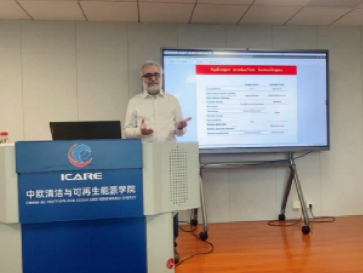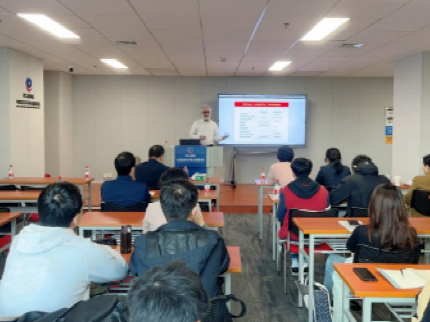To broaden the international perspective of students and understand the current status of the cutting-edge field of hydrogen energy, invited by Professor Zhengkai Tu, Professor Giuseppe Spazzafumo from the University of Cassino and Southern Lazio visited the School of Energy and Power Engineering and gave an academic lecture titled “Power to X, the fastest way to start to decarbonize the world” in the morning of October 22nd. This lecture provided in-depth introductions to the latest progress in converting electricity into other energy carriers for decarbonization in the world.
First, Professor Zhengkai Tu warmly welcomed Professor Giuseppe Spazzafumo, and briefly introduced the important positions of the University of Cassino and Sothern Lazio in the international academic community as well as Professor Spazzafumo's outstanding contributions in the field of hydrogen energy research. Then, Professor Spazzafumo began his speech. He briefly introduced the current global energy consumption and reserves of fossil fuels, as well as the changes in the utilization and proportion of fossil fuels and electricity in the past 200 years. He mentioned the urgent global demand for fuel, but the current situation is that there is more electricity production and less fuel production worldwide.

He then introduced the current status of global hydrogen energy development and elaborated on the mainstream methods of the production, transportation, utilization, and storage of hydrogen worldwide. He pointed out that at present, whether it is the production, transportation, utilization of hydrogen, or the construction of large-scale infrastructure related to hydrogen, a large amount of investment is required worldwide. However, there is currently no urgent demand for the use of hydrogen worldwide. Who will invest heavily in the hydrogen energy industry in this situation is a crucial issue.

Professor Spazzafumo also pointed out that the current bottleneck problem in hydrogen energy utilization is the production and storage of hydrogen. We can use the currently abundant electricity to produce hydrogen through electrolysis, and also use electricity to convert hydrogen into other hydrogen-based energy carriers to overcome the huge challenges in hydrogen storage and transportation. Then he provided a detailed introduction to the characteristics and usage scenarios of hydrogen-based energy carriers that are widely used, such as synthetic natural gas, methane, methanol, ammonia, and diethyl ether. He pointed out that if the above hydrogen-based energy carriers can be fully utilized and the construction of related hydrogen energy infrastructure can be accelerated, it is of great significance for the further development of the global hydrogen energy industry.

At the end of the speech, Professor Spazzafumo summarized the entire speech and expressed a beautiful vision for the future development of the hydrogen energy industry. He emphasized that the development of the hydrogen energy industry cannot be separated from international cooperation and exchanges, and hoped that the University of Casino and Southern Lazio can establish closer cooperation with the School of Energy and Power Engineering at Huazhong University of Science and Technology to jointly promote the vigorous development of the hydrogen energy industry.

After the speech, students and faculty actively interacted with Professor Spazzafumo. The questions include specific application measures for hydrogen energy as a clean energy carrier in the future, as well as international cooperation and exchange projects between the University of Cassino and Sothern Lazio in the field of hydrogen energy. Professor Spazzafumo answered each question and shared his insights and opinions. This lecture not only provided valuable academic resources and exchange opportunities for the faculty and students of the School of Energy at Huazhong University of Science and Technology, but also further deepened mutual understanding and cooperation between China and Italy in the field of hydrogen energy research. We look forward to more academic exchange activities to jointly promote the progress and development of the global new energy industry in the future.





